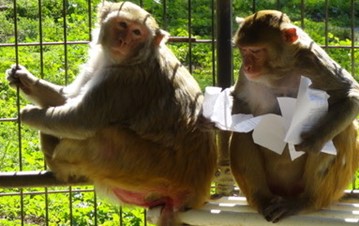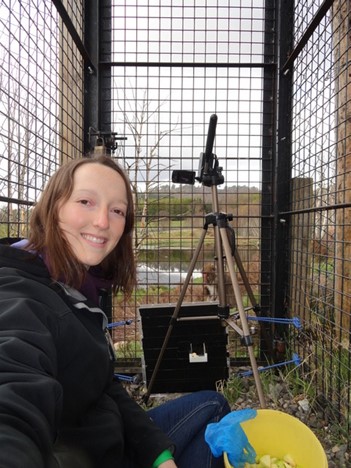
Observer ratings of animal welfare
This quarter, we are featuring the research of Dr. Lauren Robinson, who is currently a Postdoctoral Fellow at the Wolf Science Center at the University of Veterinary Medicine Vienna. Dr. Robinson completed her dissertation work at the University of Edinburgh supervised by Dr. Alexander Weiss. There, she examined the ways that observer ratings of primate welfare were associated with behavioral measures of welfare and personality in three species of primates: chimpanzees, brown capuchins, and rhesus macaques. This research was motivated by the observation that the people who care for primates, including keepers, animal technicians, and trainers, know a great deal about those individuals’ welfare. However, empirical measures of welfare utilizing this knowledge were lacking. Additionally, certain individuals of the same species seem to fare better in captivity than others, even though these individuals may live in the same environment. This suggests the influence of individual differences on welfare, such as personality. To investigate this, Dr. Robinson and her secondary Ph.D. supervisor, Dr. Matthew Leach, designed an animal welfare questionnaire, which was given to staff working with brown capuchins, chimpanzees, and rhesus macaques. They found that 1) observers agreed on their ratings of welfare; 2) welfare ratings were related to a pre-existing survey of animal well-being (i.e., the subjective well-being questionnaire; King and Landau, 2003); 3) ratings were associated with behavior in chimpanzees and rhesus macaques; and 4) that personality was consistently associated with welfare ratings, though in different ways across the species. The studies on brown capuchins and chimpanzees can be found published in Applied Animal Behaviour Science (see references below), and the third on rhesus macaques is currently under review. To learn more about observer ratings of primate welfare, watch a video presentation (https://youtu.be/9ZxTQlMrUx4) about this research narrated by Dr. Robinson.
References King, J. E., & Landau, V. I. (2003). Can chimpanzee (Pan troglodytes) happiness be estimated by human raters? Journal of Research in Personality, 37(1), 1-15.
Robinson, L. M.*, Altschul, D.*, Wallace, E. K., Ubeda, Y., Machanda, Z., Slocombe, K. E., Llorente, M., Leach, M. C., Waran, N. K., & Weiss, A. (2017). Chimpanzees with positive welfare are happier, extraverted, and emotionally stable. Applied Animal Behaviour Science, 191, 90-97. [*co-first authors]. https://www.sciencedirect.com/science/article/pii/S016815911730045X
Robinson, L. M., Waran, N. K., Leach, M. C., Morton, F. B., Paukner, A., Lonsdorf, E., Handel, I., Wilson V. A. D., Morton, F. B., Brosnan, S., & Weiss, A. (2016). Happiness is positive welfare in brown capuchins (Sapajus apella). Applied Animal Behaviour Science, 181, 145-151. https://www.sciencedirect.com/science/article/pii/S0168159116301769

